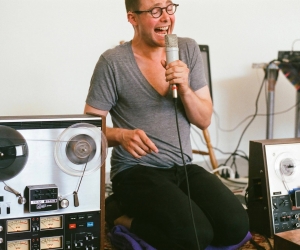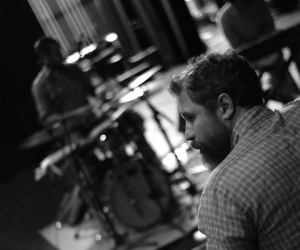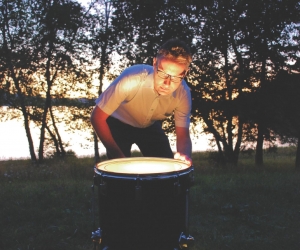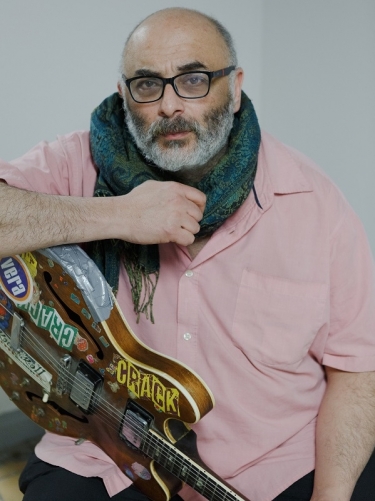
Sam Shalabi’s insightful musical take on the world can provoke both discomfort and laughter. On his numerous solo albums, he meshes guitar, oud, and field recordings into an electroacoustic collage. He leads a wide variety of small and midsize groups that encompass a who’s who of Montreal improvisers, as well as musicians of international renown, such as Alan Bishop, bassist, vocalist, and saxophonist with Sun City Girls. Shalabi also directs and composes for large ensembles, most notably his Land of Kush orchestra, which combines the sounds of 1960s Egyptian big-band pop music with free improvisation. Across all of these activities, the music he makes conjures phantasmagorical scenes that are as psychedelic as they are grounded in contemporary issues. On his 2016 solo LP Isis and Osiris, a contemplative oud solo gradually gives way to a dizzying sequence of piano runs that ascend in an endless spiral. A woman’s voice interrupts from her “front row seat to the apocalypse” to complain of fatigue, boredom, and fear. Moments later there’s a bit of comic relief, as drummer Howard Chackowicz impersonates Buddy Rich in a takeoff of the jazz drummer’s infamous ranting, with a self-aggrandizing egotistical harangue, punctuated with solo drum riffs. On the flip side, a swirling oud preludes a monologue detailing the thought process of an Islamic State supporter that may make many in the West squirm. He thus embodies an artist in the sense that Thomas Merton expressed in his book No Man Is An Island: “Art enables us to find ourselves and lose ourselves at the same time.”
Sam Shalabi’s singular musical aesthetic—a mix of punk, jazz and Arabic influences—is a product of his unique life journey. His family is from Egypt, but his father, like many Egyptians in the 1960s, sought work in Libya, and Sam was born in Tripoli. When Shalabi was five years old, his family moved to Canada, landing first in Toronto but soon travelling east to Prince Edward Island, where they lived until he was fifteen. After two high school years in New Brunswick he moved to Montreal, where he formed and played guitar in the prominent mid-1980s punk band Swamp Circuit. Ensconced in the city’s fertile music scene he discovered music beyond punk, leading to the next step in his development.
I met with Shalabi one rainy afternoon last summer in his flat in the Parc-Extension district of Montreal. Two black and white cats took turns jumping onto his lap with obvious affection as he continued his history. “I got into free jazz, and then into bop, but there was a huge chasm between what I could do and what I wanted to do. So I went back to P.E.I. to work on things, and then to St. Francis Xavier University’s jazz program, becoming a bop snob for a few years. I came back to Montreal in the early 1990s to play jazz, but I quickly realized I was not into the machismo of the straight-ahead jazz scene, even though I loved the music—and still love it. So I started Swamp Circuit again, but this time around it was more interesting, because it incorporated other stuff from jazz and all of the other musics I was into up to that point.”
Shalabi’s father had transported his huge collection of Egyptian-music LPs to Canada, and Shalabi heard the music every day growing up. “I heard it so much, but I was into punk rock and did not really connect to it. A big epiphany was hearing the first Sex Pistols LP. From there I got into Captain Beefheart and Velvet Underground. PIL’s [Public Image Limited] Metal Box was huge because it seemed to connect to everything else: experimental music and even Arabic music.” After Swamp Circuit broke up in the mid ’90s, Shalabi’s father bought him an oud as a birthday gift. “I was intrigued by it. Unlike a violin in Western music, which has no frets but is supposed to be played tempered, the oud is fretless and there is a whole other musical system to play it nontempered, the maqam [melodic modes in traditional Arabic music].”
Perhaps surprisingly, Shalabi’s exploration of Arabic music solved a completely different problem: how to make the transition from bop to more free playing. “I was into free jazz as a listener, but I did not know how to make sense of playing it. I felt limited. The more I played oud, the more it influenced my guitar playing, so I started trying different kinds of tunings and detunings on guitar. The picking technique and hearing the maqam also influenced my technique on guitar.” Shalabi noted the similarities between this and free jazz, where melodies and texture are more prominent than harmonic structure. “Because of the nature of the tuning there is not much sophisticated chordal movement in Arabic music, but it brings more melodic possibilities.” This raised its own challenges. “When faced with just seven notes, what do you do once you run through the scale? How do you build a story out of that? So what really got me into free playing was learning the oud and the maqam system of Arabic music that is associated with it. I got sick of the ‘rat in a maze’ bop system, which seemed to be a dead end. I realized many other people worked in the same zone—like John Coltrane, who towards the end of his life got into Indian music.”
Although Shalabi never studied the oud formally, he did seek out books of traditional Arabic music, and noticed that, just like blues music across the United States, it sounds different from region to region throughout the Arab world, even though the same scales are used. “Two players with the same maqam will sound completely different because of how they play the quarter tones. When I started playing with Arabic musicians they thought I was playing an Egyptian style, but this was because of what I had heard. I cannot really play traditional music; it’s not me. When I go to Egypt I hear that and it adds to my playing, but I grew up listening to so many different kinds of music. I wanted to get at something more personal.”
He was also inspired by the way social and political issues were being raised in the music he was listening to in the late 1970s and early 1980s. “What was beautiful about the post-punk period was that you finally had politics entering, not in a dumb nihilistic way, but from people questioning what they were doing. In interviews, musicians would mention Marx or Heidegger. They were art-school kids, impressing you not with technical finesse but with creativity and imagination. Their fire was coming from nonmusical sources, and to this day that is a big thing for me. I am inspired by writers. I used to write fiction, before playing music, and that template has stuck with me. I try to compose something that has meaning and resonance beyond the musical nuts and bolts. How do you put ideas into music without proselytizing, without directly saying, ‘This is what it is about’?”
These influences mix especially well in his solo albums, Isis and Osiris and Music for Arabs (2014). The latter, recorded in Cairo, represents Shalabi’s take on modern Arabic music. “The title refers to the content and structure of Arabic music—the intro, themes and variations, and quarter-tone scales characteristic of that music. There is singing and conversation in Arabic. The album was created after the revolution, which completely failed, and Sisi had come to power, so it’s darker than previous albums like Land of Kush’s The Big Mango, which was more a celebration of Cairo. I tried to take the things I loved about Arabic music and make it into something different, but it confused a lot of people who thought it was too weird to be Arabic music—more like Arabic music fifty years from now.”
Musician, composer, and sound artist Alexander MacSween, who got his start in Montreal’s punk scene drumming for The Nils, played with Shalabi in Detention, an improvising drum-and-guitar duo that performed regularly from the late 1990s to 2004. The two co-organized evenings of free improvisation called Rumble at Isart, a space in old Montreal, south of downtown. When Isart closed, the event moved uptown to the Casa del Popolo, which Mauro Pezzente had just taken over, and a burst of activity followed, which continues to this day. MacSween explains Shalabi’s seminal role in Montreal’s experimental music scene: “So much grew out of what Sam started at Isart, which was as much about punk as it was about free jazz. Sam plays music as an extension of how he lives his life: curious and open. There are so many ideas of what improv should or should not be, like in the workshops by Eddie Prévost, where extended technique was the thing: you needed to be as far away as possible from sounding like you were playing something. Sam had no interest in that, and what became apparent to me is that our playing was an extension of our verbal conversations, an informal way of exchanging somehow. We would have dinners before, and the concerts were like dessert. Much of that came from Sam being so nondogmatic, not interested in strict theory. He has confidence that anything that happens is OK, there is no right or wrong.”
Chris Burns, a Montreal singer, guitarist, and drummer, has played in Montreal bands such as Terminal Sunglasses and Slaphappy 5 since the early 1980s. He has been performing with Shalabi for three decades now, and relates how the concept of spontaneous composition was introduced to him in the improvisational guitar duo The Crib Death of The Un-Cool: “Sam would come over to my apartment and he would suggest things like ‘let’s intentionally play in different keys that don’t necessarily harmonize nicely together and see if we can make it interesting’ or ‘let’s both only play individual notes and leave lots of space in between them’ or ‘don’t worry about chords or notes, and play your guitar like a percussion instrument.’ Then he had us playing tunes by Ornette Coleman, Thelonious Monk, Albert Ayler, and Coltrane, taking them way, way out. I remember telling him, ‘Sam, I can’t play jazz!’ and him replying, ‘Maybe not, but you can fake it.’ Basically, he was blowing my mind and kicking my ass at the same time.” Burns and Shalabi formed Nutsak in the early 2000s, which also included André Asselin on bass and Howard Chackowicz on drums. In addition to rock covers, Nutsak plays bop, klezmer, blues, and funk tunes, with an anything-goes spirit, and the group has evolved into one of the city’s most explosive bands. “Sam is always willing to explore new things and I am always thrilled when he invites me along for the adventure,” Burns says.
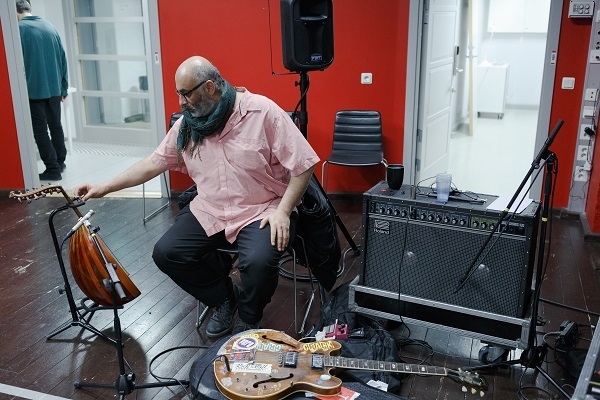
Shalabi’s music may have developed from his punk, jazz, and Arabic roots, but his artistic range is considerably wider. He has composed everything from string quartets to pop dance-music for film soundtracks (see sidebar), and his recording and concert activity is equally varied.
The Dwarfs of East Agouza is an improvising trio with Alan Bishop and keyboardist Maurice Louca, an Egyptian musician and composer with a long list of theatre and film soundtrack credits. Bishop, who also contributed to Music for Arabs and lived in the same apartment complex as Shalabi in Cairo, explains how improvising with Shalabi is different from playing with other string players: “Sam has a deep understanding, acceptance, and patience with rhythm, and in the Dwarfs he solos rhythmically in a way no other guitarist I’ve played with ever has. Sam is perceptive of the power of being part of the foundation in a solo, and therefore polyrhythms are easier to establish and maintain, and the music lifts off the ground higher than can be achieved otherwise—the rhythm is the solo. It’s still a secret that loud, heavy polyrhythms are as powerful an ecstatic phenomenon as anything else—perhaps even more powerful. The Africans have it figured out, and the rest of the world is still way behind. It’s the group polymosaic pummelling the ego of solo empire into dust.”
His jazz quartet, a supergroup of sorts, features saxophonist Brahja Waldman, Suuns drummer Liam O’Neil, and bassist Morgan Moore from The Barr Brothers. The quartet started out playing standards by Monk, Sonny Rollins, and Coleman, but its debut recording includes only original tunes. “It’s a jazz group that does not hold back at all, yet it is not free jazz either,” Shalabi explains. “We stretch it as far as it can go and still remain jazz.”
In his synth duo Moose Terrific, with Montreal electronic noise musician and composer Tamara Filyavich, Shalabi plays a Korg MS-20 and some smaller synths. Moose Terrific emerged after Joshua Stevenson, a Vancouver-based sound engineer who also creates ambient music under the stage name Magneticring, visited Shalabi in Cairo. “He did not bring his synths, so a friend lent us an MS-20 reissue,” Shalabi recalls. “I was amazed by it, so I bought one and went on a binge of playing that instrument. It is refreshing to play synth because I do not quite know how to control what I am doing—so different from guitar and oud.”
One of Shalabi’s most challenging recent compositions was the soundtrack for Gertrude Stein’s play Short Sentences, a collaboration with Adam Frank. Frank is a professor at the University of British Columbia who specializes in English literature and poetry and cochairs the UBC Graduate Program in Science and Technology Studies. His Radio Free Stein project presents audio-only versions of Stein’s lesser known plays, allowing listeners to concentrate on how her words merge with the music and other sounds. The original version of Short Sentences has more than 250 characters; even with the number of characters whittled down to twelve, as it is for this project, the composition was a massive undertaking. The play is mostly dialogue and consists almost exclusively of characters just naming people, similar to Robert Ashley’s In Sara, Mencken, Christ and Beethoven There Were Men and Women. Shalabi took the road less travelled. “I had the idea to do something [other] than the usual Schoenberg-y modernist thing you often hear backing Stein’s plays—more musical theatre, with elements of diatonic music, with Laurel Canyon, Judee Sill, or Beach Boys type harmonies. So I wrote for piano, harp, string quartet, electronics, bass, and drums, along with a choir and the twelve soloist characters. It was hard to write because the text is so monochromatic, just a bunch of names with no real emotional content. I orchestrated the names into sung melodies. I never had to synch text to music before, and it took me about a year to write.”
Shalabi recently completed a new composition titled "Sand Enigma" for a twenty-three-member version of his Land of Kush orchestra, which premiered at Toronto’s Music Gallery on March 24 2018, with a follow-up performance in Montreal on April 2. This extravaganza featured five singers and a cast from around the globe, notably Vancouver violinist Josh Zubot, who helped with orchestration, and Maurice Louca and vocalist Nadah El Shazly, both of whom travelled in from Cairo for the shows.
Shalabi finds joy and purpose in his broad range of activities. “Music is one of the few things in the world where you can build complicated structures out of thin air. Experimental music is a good term for what I do, it is the same impetus as when you are just a kid playing around. There is incredible mystery in music. It is completely open, egalitarian, generous, and endless.”
"Shalabi Soundtracks" sidebar article available in PRINT or DIGITAL editions only.
Photos of Sam Shalabi in Sweden 2018 by Tony Elieh.
